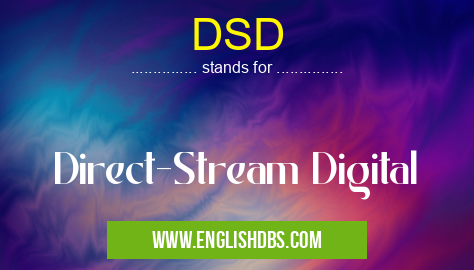What does DSD mean in ELECTRONICS
Direct-Stream Digital (DSD) is an advanced audio format designed for audiophiles. It was created by Sony and Philips in the late 1990s to create a new, high resolution sound format for digital audio devices. DSD is the only audio format that can transmit information at the same rate as analog sound. This makes it ideally suited for recording and playback of high resolution sound.

DSD meaning in Electronics in Academic & Science
DSD mostly used in an acronym Electronics in Category Academic & Science that means Direct-Stream Digital
Shorthand: DSD,
Full Form: Direct-Stream Digital
For more information of "Direct-Stream Digital", see the section below.
Essential Questions and Answers on Direct-Stream Digital in "SCIENCE»ELECTRONICS"
What does DSD stand for?
DSD stands for Direct-Stream Digital.
How is DSD different from other formats?
Unlike other digital formats, like CD-quality or MP3, which use pulse code modulation to encode audio data, DSD uses delta-sigma modulation which is less susceptible to degradation caused by compression or other encoding processes. As a result, the audio quality with DSD remains true to its original source material.
What are some common applications of DSD?
Modern-day applications of DSD include professional studio mastering and archiving, as well as usage in consumer electronic products such as Blu-Ray players and portable music players.
What are some benefits of using DSD?
The primary benefit of using DSD is that it can produce high resolution sound without any lossy compression or artifacts that occur when compressing an audio signal into a more compressed format such as MP3 or AAC. Additionally, due to the lack of data loss with DSD, it creates very accurate recordings which results in superior playback quality compared to other formats such as CD's or even vinyl records.
Is there any disadvantage to using DSD?
The main disadvantage of using DSD is its compatibility with existing equipment and software. Since most devices are not equipped to decode or store files encoded in this format, users may require specialized hardware and software tools in order to listen or store their music library in the format if they choose it over one of the more widely available file types such as MP3 and WAV files.
Final Words:
DSD provides audiophiles and professionals alike with an exceptionally high quality source material despite its lack of compatibility with existing technology standards. While not quite ubiquitous yet, support for this challenging yet rewarding technology continues to grow among both modern day consumers and enthusiasts alike who strive for nothing but the best when it comes to their audio sources.
DSD also stands for: |
|
| All stands for DSD |
